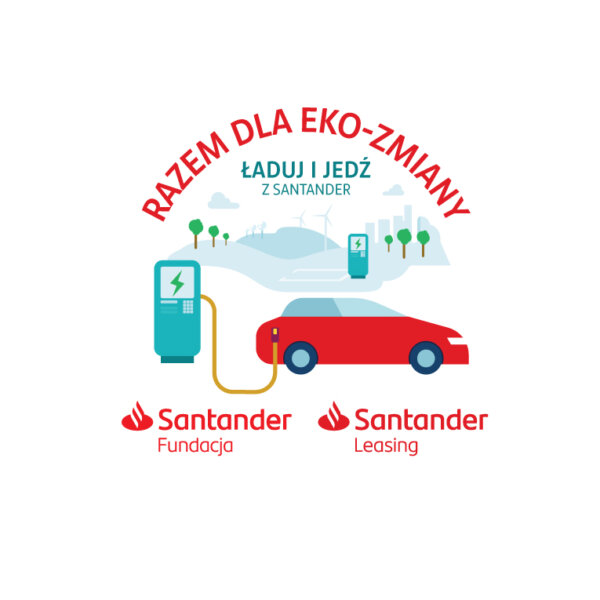New grant programme – charging stations for electric cars for local authorities





The first nationwide grant programme for local authorities in the leasing industry was launched on 6 June. The project 'Together for Eco-Change’ entails the provision and maintenance of a network of electric vehicle charging stations. The Santander Bank Polska Foundation and Santander Leasing are responsible for implementing the programme and GreenWay Polska and the Polish Alternative Fuels Association (PSPA) were invited to cooperate.
The aim of the competition is to fully finance the construction of no less than 16 charging stations for electric vehicles and to maintain them for 2 years. An amount of PLN 1 million has been earmarked for this purpose. The programme is open to all local and regional authorities with a population of up to 100 000 inhabitants at the date of the competition announcement.
We are all aware that currently one of the main concerns of drivers about using electric cars is the availability of charging stations. Especially outside motorways and large agglomerations. Therefore, as a leasing industry company, we want to have an impact on filling the white spots in the Polish electromobility network in order to reduce these fears. We believe that in this way we can contribute to an increase in the number of electric cars which means less exhaust fumes and less noise, both in large cities and small towns, in areas where we live, play sports or go for walks every day.
We have been working with local governments for many years, on various levels, including through our grant programmes. This time we have a project dedicated exclusively to local authorities
The development of the infrastructure of charging stations for electric cars fits in very well with the ESG strategy of the Santander Bank Polska Group, which involves, among other things, supporting customers in their green transformation and actively promoting pro-environmental activities. After the grant programme „Here I Live, Here I Make Eco-Changes” implemented by the foundation from 2020, this is our next ecological initiative.
Forecasted dynamic growth of Polish electromobility
Our experience of working with local authorities, such as the construction of municipal chargers in Katowice, has been very positive. By joining the energy transition process, local governments can play a very important role as local leaders of change. Local government structures are where the knowledge of local conditions can be found, making it possible to tailor local infrastructure to meet the needs of local residents.
By 2030, the total number of pure electric vehicles (cars and vans) registered in Poland will increase to almost one million, according to the latest edition of the „Polish EV Outlook” report, prepared by the Polish Alternative Fuels Association. The study also shows that the network of publicly available charging infrastructure in Poland will expand from about 5,000 stations today to almost 100,000 in 2030.
Between 2019 and 2022, the number of publicly available charging stations in Poland increased by about 2.5 times. However, the infrastructure is mainly concentrated in large urban centres (56%) with more than 100,000 population. In this context, it is crucial to diversify the location of chargers more in order to accelerate the process of developing the electric car fleet in different parts of the country. That is why we are counting on local authorities from smaller towns to join the project.
As PSPA’s analyses show, it is mainly companies that register electric cars. In 2022, businesses (excluding sole traders) accounted for as much as 78 per cent of new pure electric passenger car registrations – 8 per cent more than in 2021.
The steadily growing role of leasing companies in financing investments in this vehicle segment is confirmed by the latest figures from Santander Leasing. As the results show, by mid-May this year, the growth rate of the Company’s financing of electric vehicles was as high as 144 per cent year-on-year. The number of charging stations grew at a similar rate: in 2022 an increase of as much as 140 per cent was recorded.

Regions with the highest electromobility rates
Electromobility continues to be concentrated mainly in the largest urban centres. The first edition of the 'Polish EV Outlook 2023′ report shows that the largest number of electric cars – almost 22 per cent of the entire Polish fleet – were registered in Warsaw. In 2022, the capital city also accounted for more than 21 per cent of new BEV registrations. Approximately 26 per cent of the pure electric cars wee registered in cities with a population between 300,000 and 1 million people, such as Kraków, Łódź, Wrocław, Poznań, Gdańsk, Szczecin, Bydgoszcz and Lublin.
According to an analysis of financing by Santander Leasing, the TOP 5 provinces where entrepreneurs finance the most electric vehicles include Mazowieckie, Wielkopolskie, Dolnośląskie, Małopolskie and Pomorskie.
Detailed information can be found on the project website at ”Together for Eco-Changes”.




